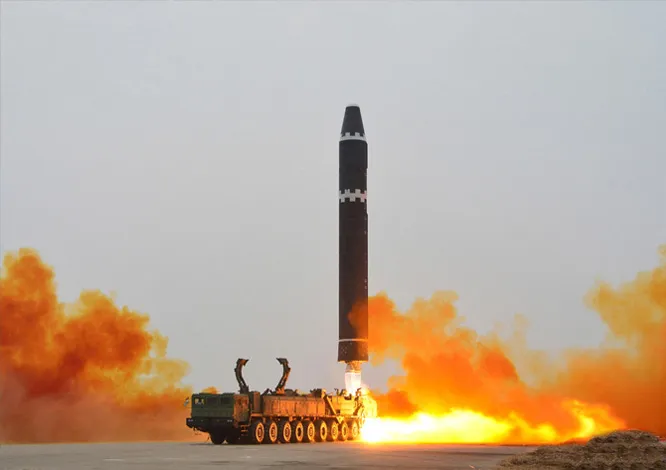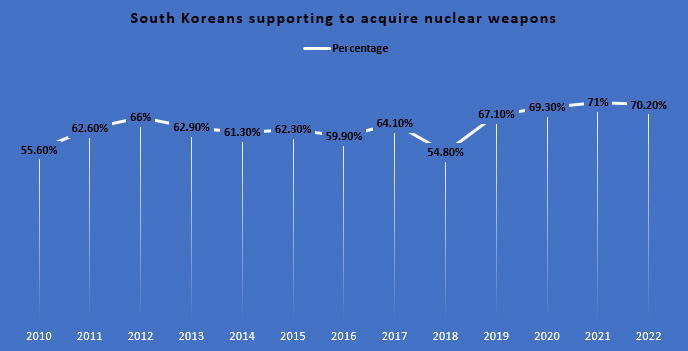-
CENTRES
Progammes & Centres
Location
The continuous threat from Pyongyang is pushing Seoul towards developing its indigenous nuclear defense

Amidst the ongoing conflicts between Ukraine-Russia and Israel-Hamas, the Korean Peninsula also faces a persistent crisis due to North Korea's continual nuclear rhetoric. The recent artillery shells fired by Pyongyang near the sea border have created a furore in the region. According to Seoul, Pyongyang fired over 350 rounds of artillery over the last weekend. The firing was a reaction to the military activities conducted by what was referred to as South Korea's ‘military gangsters’ and the border-based drill exercises. Moreover, the launch of the Hwasong-18, an Intercontinental Ballistic Missile (ICBM) in December 2023, and the declaration of a nuclear attack ‘anytime’ has marked a significant development. Kim Jong-Un also reiterated the threat to nuke the United States (US) if provoked and asserted that the launch was due to military confrontation hysteria against the former.
The firing was a reaction to the military activities conducted by what was referred to as South Korea's ‘military gangsters’ and the border-based drill exercises.
The recent heightened threat is particularly concerning for South Korea. Even in 2022, over 70 missiles were fired by Pyongyang leading to an increased demand for developing nuclear weapons by the South Korean public. This piece explores Seoul’s complexities of grappling with a nuclear challenge, domestic pressure for greater autonomy, external threats, and the developing facets of international security.
Seoul depended largely on Washington for its security, however, in the post-Cold War era, to gain economic benefits and counter Pyongyang’s rising threat, it started engaging with Beijing. Seoul’s accommodating foreign policy has not allowed it to strike a balance between its alliance and autonomy, making it tougher to navigate its foreign policy independently, especially its nuclear policy. In light of growing Pyongyang’s nuclear threat, Seoul has found itself in a web of geopolitical situations depicting its complex and multifaceted nuclear issue.
To independently navigate its foreign policy, Seoul has been actively involved in multiple diplomatic engagements such as establishing closer ties with the QUAD and being vocal against Beijing’s aggressions, and multilateral initiatives like the New Southern Policy, and Indo-Pacific Strategy. South Korean President Yoon Suk-Yeol also recently discussed the potential for South Korea to develop its nuclear weapons or reintroduce US tactical nuclear weapons to counter the exponential rise of North Korea’s nuclear threat. Previously under Park Chung-Hee's rule, Seoul had initiated developing nuclear weapons only to get curtailed by Washington. Although Yoon has rejected the call for immediate nuclearisation, his statements have reshaped and initiated the domestic discourse on the country’s nuclear ambitions. Thus, it is important to explore the intricacies of this situation, considering the continuous threat posed by Pyongyang, internal factors pushing Seoul towards a nuclear defense, and the external factors advising caution.
South Korean President Yoon Suk-Yeol also recently discussed the potential for South Korea to develop its nuclear weapons or reintroduce US tactical nuclear weapons to counter the exponential rise of North Korea’s nuclear threat.
North Korea's looming nuclear shadow: A looming nuclear threat on Seoul emerges as Pyongyang persists in its missile barrage and unwavering pursuit of nuclear weapons. Pyongyang's invariable rhetoric of a nuclear attack was amplified after the former fired dozens of missiles toward Seoul in November 2022. One of the missiles landed in South Korean territory, the island of Ulleungdo, for the first time since the end of the Korean War (1950-53). These missile launches heightened tensions, prompting the South Korean government to issue an air-raid warning on the island. This had a significant impact on South Koreans with polls showing a noticeable increase in support for developing its indigenous nuclear defense.
A survey carried out by the Asan Institute for Policy Studies revealed that 64.3 percent of Koreans vouch for independently developing nuclear weapons. Additionally, a joint survey by the Chicago Council on Global Affairs and the Chey Institute for Advanced Studies indicates that over 70 percent of Koreans favour the idea of their state developing nuclear capabilities in response to rising nuclear threats. This sentiment is heightened by Pyongyang’s blitzkrieg of missile attacks on Seoul and its revamped nuclear strategy, reinforcing the perceived necessity for indigenous nuclear weapons.

Source: The Asan Institute for Policy Studies (2010-2020, 2022); Chicago Council on Global Affairs (2021)
Chinese belligerence: Beijing, as a longstanding supporter of Pyongyang, has heightened tensions by endorsing the Kim regime. This position is further exacerbated by China's recent declaration of a renewed threat to invade Taiwan. In case of an invasion of Taiwan, China might leverage North Korea's defense power to unlock an additional military front, creating a dual threat for both the US and South Korea. This particular strategy will discourage the US from getting involved in the Taiwan dispute. Furthermore, Beijing’s strong objection to the installment of the Terminal High Altitude Area Defense (THAAD) system in Seoul, followed by punitive economic coercions has greatly restricted Seoul's ability to deter and shield its security and economy. As a result, the South Koreans are considering China as a significant threat in the coming hence, want nuclear weapons to tackle the dual threats.
In case of an invasion of Taiwan, China might leverage North Korea's defense power to unlock an additional military front, creating a dual threat for both the US and South Korea.
Eroding trust in the US nuclear umbrella: The protracted dependence on the US nuclear umbrella has encountered challenges attributed to perceived inconsistencies in American commitment. Notably, the “America First” policies of the Trump administration, which included the proposal to withdraw up to 4,000 US troops from South Korea for financial reasons and an ambiguous stance on denuclearisation, have engendered apprehensions regarding the reliability of the nuclear umbrella. These developments have fuelled pro-nuclear sentiments within South Korea.
Despite the recently signed Washington Declaration, aimed at mitigating the nuclear threat by deploying nuclear-armed submarines in South Korea, it has not adequately addressed concerns among South Koreans regarding the US's ability to fully and credibly commit to their security, thus sustaining a robust nuclear debate in the country. There is a genuine concern that the US will prioritise its cities and citizens' safety over those of Koreans, prompting contemplation of developing indigenous nuclear capabilities. Furthermore, potential nuclear technology sharing between Russia and North Korea raises the possibility of South Korea seeking to revise alliance agreements to initiate a nuclear-powered submarine programme, referred to as an SSN programme. Gabriela Bernal, an independent DPRK watcher, suggests that if South Korea perceives abandonment by the US, there is a likelihood of future disregard for US wishes and a pursuit of the nuclear option to safeguard its security.
Technological prowess and nationalist aspirations: The momentum behind the proposal to develop nuclear weapons surged following the rejection by the US of President Yoon's suggestions, either to redeploy US tactical nuclear weapons to the peninsula or for South Korea to acquire its independent nuclear capabilities. This has fuelled a growing sentiment of national pride and a desire for strategic autonomy, bolstering arguments in favour of an indigenous nuclear programme. Additionally, South Korea possesses advanced scientific and technological capabilities crucial for potential nuclear weapons development, providing the country with greater control over its nuclear policies. However, the feasibility of South Korea emerging as a nuclear power in the current global context necessitates careful reconsideration, introducing uncertainties to the prospect of developing nuclear weapons at this juncture.
South Korea possesses advanced scientific and technological capabilities crucial for potential nuclear weapons development, providing the country with greater control over its nuclear policies.
The nuclear predicament in South Korea reflects the wider challenges of the global nuclear non-proliferation regime. Effectively addressing this requires South Korea to skillfully blend diplomatic efforts, regional collaboration, and a strong conventional defense, ensuring a secure future for both the nation and the broader region.
Revitalising the alliance can assuage South Korea's security concerns through intensified security cooperation, joint military exercises, and a renewed commitment to extended deterrence, thus obviating the need for nuclear armament. In this vein, South Korea and the US recently finalised the establishment of guidelines for the planning and execution of a joint nuclear strategy by mid-2024. These guidelines encompass a broad spectrum of issues, including the sharing of sensitive nuclear information, the establishment of a pertinent security system, the formulation of consultation procedures for nuclear crises, the operation of a real-time leader-level communication channel, and plans for managing crises and reducing risks
Moreover, above bolstering Seoul's defense potential, there is an important need for an increased focus on addressing nuclear threat denuclearisation through multilateral platforms like G20, United Nations Security Council (UNSC) and diplomatic efforts such as increased trilateral cooperation between South Korea, Japan, and the US, and the proposed resumption of trilateral talks between China, South Korea, and Japan. In addition, Seoul’s quest for inclusion in the Quad umbrella to discuss denuclearisation talks will apply pressure on Pyongyang beyond international sanctions. Although complete denuclearisation is not guaranteed, these efforts have the potential to reduce rhetoric and promote discussions on denuclearization.
Revitalising the alliance can assuage South Korea's security concerns through intensified security cooperation, joint military exercises, and a renewed commitment to extended deterrence, thus obviating the need for nuclear armament.
Although Yoon's recent weighing on nuclear development and striving to broaden diplomatic ties portrays Seoul’s refined strategic approach. However, to navigate this impending situation, a subtle balance must be maintained between the US-Korea nuclear alliance, addressing domestic security concerns, and engagement in diplomatic initiatives. The support of the US is important but even if the current US administration embraces a traditional method and offers reassurances to Korea, policymakers must remain vigilant of the future US administrations' different approaches post-US elections in 2024. Seoul’s challenge lies in finding a refined and comprehensive method that ensures its security and contributes to broader regional stability. Furthermore, South Korea’s economy is export-driven and any attempt of developing nuclear weapons can cripple its economy as it will be highly vulnerable to international sanctions. Moreover, it will destabilise regional security, promote an arms race, jeopardise its global standing, and aim to become a middle power. Therefore, the stance on developing nuclear weapons, despite being the best solution, remains vague but the demand will continue to grow in the future.
Abhishek Kumar Singh is a doctoral candidate in IR at Kookmin University Seoul.
The views expressed above belong to the author(s). ORF research and analyses now available on Telegram! Click here to access our curated content — blogs, longforms and interviews.

Abhishek Kumar Singh is a PhD Candidate in IR at Kookmin University Seoul on a GKS scholarship. He worked as a RA under an Indian ...
Read More +